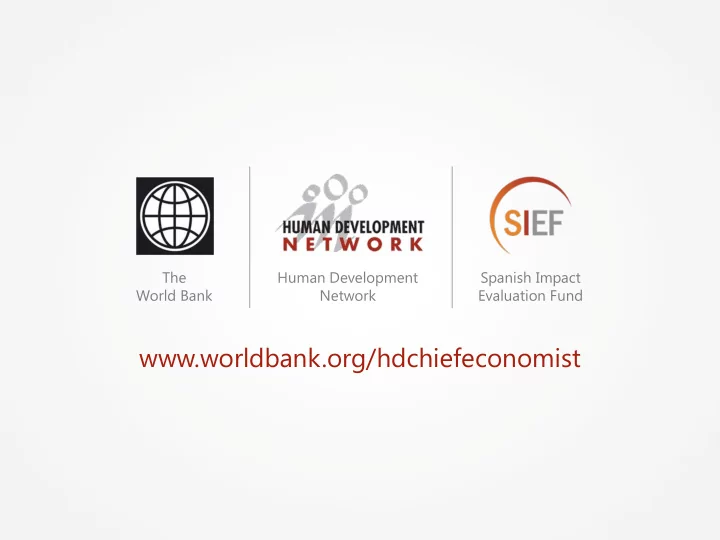

The Human Development Spanish Impact World Bank Network Evaluation Fund www.worldbank.org/hdchiefeconomist
Evaluating Impact: Turning Promises into Evidence Livelihood Empowerment Against Poverty (LEAP) Dept. of Social Welfare, MESW Accra, Ghana May 2010
1. Background Initiated as part of the Ghana Poverty Reduction Strategy that resulted in the development of the National Social Protection Strategy LEAP was designed as a flagship of the NSPS to provide Conditional and Unconditional Cash Transfer for the extremely poor with greater emphasis on women and children Beneficiaries include households with OVCs, Elderly and Disabled 1,654 households in 2008 benefited from the LEAP Grants in 21 districts By December 2009, a total of 30,000 households were enrolled unto the programme in 80 districts nationwide. It is expected that 164,370 households will be receiving LEAP by 2012 Beneficiaries receive between GhC 8 – GHC 15 per month, paid once every two months
1. Background At Programme inception, no Baseline was conducted (i.e. taking a Control and Treatment Group) Baseline Survey conducted as part of the ISSER/YALE Panel Survey (5,000 national representative Survey 700 households that have been identified to receive LEAP were targeted in the Baseline Survey (Treatment Group), and a similar group from the 5,000 will be used as the Control
2. Results Chain LONGER-TERM INPUTS ACTIVITIES OUTPUTS OUTCOMES OUTCOMES HIGHER ORDER GOALS Reduction in Regular Provision of Increased Provide Cash Identification of o o o o enrolment & extreme Cash to households Transfer Beneficiaries to meet subsistence retention poverty needs Cost of Transfers Data o Improved Improved Management o o access to MIS System in place food security Cost of DSW o o and diet social personnel. Knowledge and diversity services Sensitization o awareness available Cost of o at district and Improved transportation Training o community levels on access to LEAP . health Cost of Training Facilitation for o DLIC/CLIC services CLIC/DLIC Education, Birth o esrtablished & Registration trained Increase d Cost of Health Services o o birth Coordination Increased enrolment registration Payment of Cash o and retention Cost of NHIS to Households o Registration Increased in birth o registration and Motobikes o immunization Bicycles o No. of children in Work Stations o o
3. Primary Research Questions Is LEAP targeting and reaching the intended beneficiary households? Has LEAP improved access to social services: school enrolment & retention, NHIS registration , birth registration Has there been an increase in food intake and variety. Has LEAP led to acquisition of productive assets Has LEAP been effective and efficient in programme delivery to the beneficiaryies
4. Outcome Indicators % Changes in School Enrolment & Retention Completion of full immunization among babies and children NHIS registration No of meals Diet diversity Level of Poverty status of households Productive Assets
LEAP Evaluation Design: Difference in Differences Propensity Score Matching Baseline on Follow-up T 0 T 1 future on T 0 -T 1 = D T participants participants (N=700; (N=700; 2010) 2012) Difference-in differences ISSER/Yale National Socioeconomic D T – D C = DD Survey (N=5000; 2010) C 0 Follow-up on C 1 Matched C 0 -C 1 = D C comparison comparison group group (2012)
7. Time Frame / Work Plan Quantitative Survey Baseline 2010 Baseline report December 2010 Qualitative Assessment/Beneficiary Assessment 2011 Follow-Up 2012 Impact evaluation report December 2012
8. Sources of Financing Government of Ghana DFID Institutional Strengthening Programme World Bank UNICEF
Recommend
More recommend